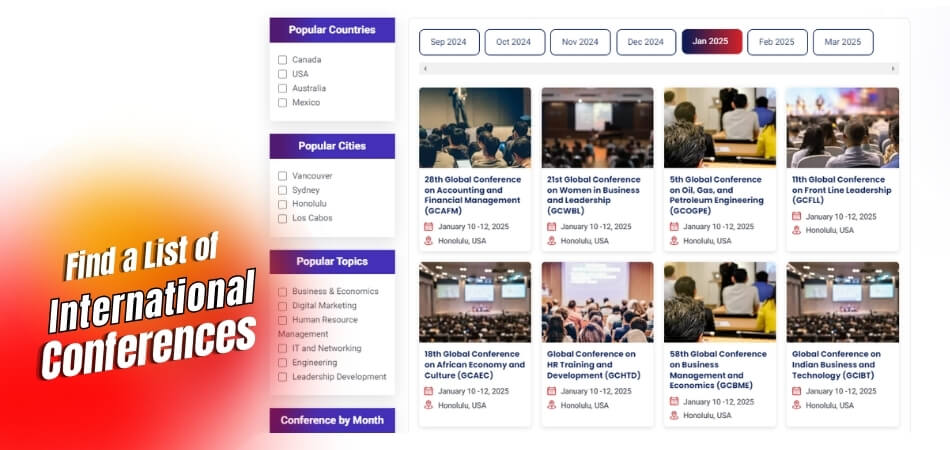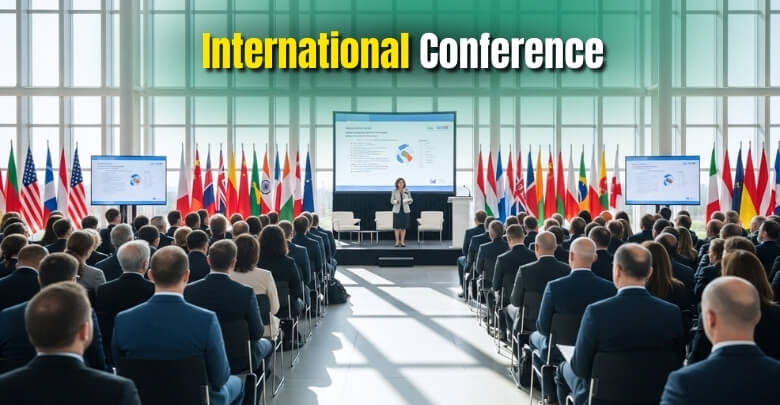International conferences bring people together from different countries to share ideas, research, and knowledge. They create a space for learning and building global connections without borders. If you are someone curious about such events, you may already be thinking, How do I find a list of international conferences?
The easiest way to find a list of international conferences is through online portals, official conference websites, professional networks, university pages, event platforms, social media, and newsletters. These sources regularly publish updated details about upcoming conferences, including dates, locations, topics, registration links, and participation options.
Do you want to know the best ways to explore and keep track of these conferences? Are you curious about the trusted sources where all the important details are shared? Keep reading this article, as you will find every necessary piece of information explained in simple and clear steps.
How Do I Find a List of International Conferences?
Finding international conferences can be very helpful for people who want to learn, share, or connect with others in their field. There are many ways to discover these events, both online and offline. Let’s look at some simple methods for finding international conference lists.
Conference Websites
Many conferences have their own official websites. These websites usually share all the details like dates, venues, topics, and registration links. You can also find past events and updates for the next ones. Checking directly on such websites is one of the easiest ways to get accurate information.
Academic Portals
There are several academic portals that collect and list international conferences from around the world. These portals usually divide events by subject, date, or location. You can search for the area you are interested in and quickly find a list of conferences. They also provide links to registration pages, making it easy to join.
Professional Networks
Joining professional networks online can help you stay updated about international conferences. Websites like LinkedIn often have posts about upcoming events in different fields. Many organizations share their conference news through groups and pages. Being active in these spaces can help you discover events on time.
University Notices
Universities often host or promote international conferences. Their websites or notice boards usually list events that involve research, science, or other academic fields. You can also find details about speakers, schedules, and call-for-papers if you are into research. Checking university event sections can be a smart move.
Event Platforms
Online event platforms like Eventbrite and Global Conference Alliance Inc. often include international conferences. These platforms let you search by topic, city, or country. They usually include ticket details, schedules, and even online options for people who cannot travel. Exploring these sites makes finding global events easier.
Social Media Updates
Social media is another great way to stay informed. Many conferences have official pages or hashtags where they share updates. Following these accounts will help you know about new announcements and deadlines. A quick search on social platforms can often lead you to upcoming events.
Newsletters
Subscribing to newsletters from organizations, universities, or academic publishers can keep you updated. These emails usually include announcements of international conferences. They also share important deadlines like registration or paper submission. Keeping track through newsletters saves time and ensures you don’t miss important events.
Why Look for International Conferences in the First Place?
International conferences bring together people from different places, ideas from different fields, and opportunities that can create meaningful results. They are not just about events but about what happens when knowledge is shared worldwide. Here is why they are worth exploring:
Learning Opportunities
Attending international conferences offers access to fresh knowledge and advanced research. Experts often share their latest findings, many of which are not yet available in books or online. Listening to these sessions can spark new perspectives and make learning more practical and relevant.
Meeting Experts
You get the chance to meet well-known experts in person at international conferences. These meetings can help you understand their work better and sometimes even ask them direct questions. Many people value this one-on-one learning. It makes the whole event feel more personal and valuable.
Global Networking
These events bring together people from different countries and industries. Meeting people from across the globe can help you build strong professional connections. You may meet future partners, mentors, or collaborators at such events. Networking at this scale is hard to find anywhere else.
Career Growth
International conferences can boost your career in many ways. Attending or presenting at these events adds value to your professional profile. It shows your interest in staying updated and active in your field. Employers often look at such activities as a strong plus point.
Sharing Ideas
Such conferences give a platform to share your own thoughts and research. Speaking in front of an international audience helps others learn from you as well. It builds confidence and recognition for your work. Sharing ideas makes you part of a bigger conversation.
Cultural Exchange
When people from different places come together, cultural exchange naturally happens. You get to learn about traditions, perspectives, and ways of working from other countries. This makes the event more colorful and enriching. It helps in building respect and understanding across cultures.
What Are the Signs That Show a Conference Is International?
Conferences happen all around the world, but not all of them are international in scale. Some may focus on local groups, while others bring people from different countries. To know the difference, you need to look for clear signs.
Global Audience
A true sign of an international conference is the presence of people from many countries. You will notice participants joining from different regions, not just one area. The audience often includes students, researchers, professionals, and experts worldwide. Looking at the list of attendees can help in identifying national & international conferences based on where most of the people are coming from.
Worldwide Speakers
International conferences usually invite speakers from several countries. They aim to bring different perspectives and fresh ideas from various places. Seeing a list of speakers that includes people from different continents is a strong signal. It highlights the global reach of the event.
Multiple Languages
Many international conferences offer content in more than one language. This can be through live translations, subtitles, or separate sessions. The goal is to make it easier for people from various countries to understand and take part. Language support is a good clue about its scale.
International Topics
The subjects discussed often cover global issues or trends. These topics are not limited to one region but are relevant to many countries. Examples include climate change, technology, global trade, and health research. If the theme connects across borders, it shows the event is international.
Partnerships Abroad
Organizers of international conferences often work with foreign universities, organizations, or companies. These partnerships help make the event more diverse and respected. When you see sponsors or partners from different countries, it reflects the event’s global nature. It proves the reach is not just local.
Location Variety
Such events may not always be held in the same country. They often move from one place to another every year. Changing locations allows different regions to host and join easily. This rotation is another sign of an international conference.
Is LinkedIn a Good Tool for Tracking International Conferences?
Yes, LinkedIn can be a good tool for keeping track of global events. It allows people to see updates, follow organizations, and connect with groups that share details about conferences. Look below to know how to track international conferences with LinkedIn:
Follow Relevant Pages
Start by following the pages of universities, conference organizers, and professional groups. These pages often post details about their upcoming international conferences. By staying connected, you’ll get updates right in your feed. This saves time and keeps you informed without searching.
Use the Search Bar
LinkedIn’s search bar helps you find posts, events, or pages related to specific conferences. You can type keywords like “international conference 2025” or a topic you’re interested in. The results will show recent posts, events, and discussions. This makes finding events quick and easy.
Join Industry Groups
Many LinkedIn groups are focused on certain fields or industries. Members share useful updates, including conference announcements. Joining these groups keeps you informed about events that match your interests. It’s a simple way to stay in the loop.
Check the Events Tab
LinkedIn has an Events tab where you can find upcoming events, including international ones. These events may be in-person or virtual. You can also RSVP and get reminders. It’s a handy tool to manage the events you want to attend.
Look at Hashtags
Hashtags like #InternationalConference or #GlobalSummit are often used in posts about upcoming events. You can click or search for these hashtags to see what’s trending. Many organizers use them to promote their events. It’s a smart way to discover new conferences.
Connect with Speakers
Speakers often post about the events they are joining. Following or connecting with them can lead you to conference news before it’s widely shared. You may also find links to register or join as a participant. This method gives you early access to event updates.
How Do You Confirm the Authenticity of a Conference?
Not every conference you see online is real or trustworthy. Some may look professional, but may not be genuine events at all. To make sure you do not fall into a trap, you should always check for certain signs.
Official Website
A genuine conference always has an official website. The website should clearly show details about dates, location, agenda, and speakers. If the site looks incomplete or lacks proper contact details, it may not be reliable. Always check if the website has updated information.
Recognized Organizers
Authentic conferences are run by well-known organizations, universities, or professional groups. Checking the background of the organizers can give you confidence. If the names are unknown or suspicious, it may be a red flag. Reliable events always have trusted bodies behind them.
Speaker List
Look at the list of speakers carefully. Well-known experts are usually invited to genuine conferences. If the names of speakers are missing, fake, or unrelated to the field, you should be cautious. Real conferences share full details about their speakers.
Published Schedule
Every authentic conference provides a clear schedule. The program should include session topics, times, and activities. If you cannot find a proper agenda, it may mean the event is not serious. A published schedule is one of the easiest things to verify.
Contact Information
A real conference will always provide proper contact information. This includes emails, phone numbers, or office addresses you can check. If you only see a random form or no contact at all, it is not a good sign. Genuine events welcome direct communication.
Indexed Proceedings
Many trusted conferences publish their papers in journals or digital libraries. You can check if past proceedings are available online. If there is no record of earlier events or publications, the conference may not be reliable. Indexed proceedings are a strong sign of authenticity.
Reviews and Feedback
Search online for reviews or feedback about the conference. Previous participants often share their experiences on forums or social media. If most reviews are negative or warn about scams, you should avoid it. Positive feedback from past events is always a good indicator.
Is Joining an International Conference Hassle-free?
Joining an international conference may feel exciting, but it is not always simple. Travel, documents, and schedules often create difficulties. Despite the challenges, people still choose these events because they want valuable experiences, strong connections, and updated knowledge worldwide.
When attending right international conference, one must check invitations, registration, and visa requirements beforehand. Payment systems, confirmation emails, and deadlines matter too. Careful planning ensures a smooth process and avoids sudden issues that may ruin the overall experience unexpectedly.
Many organizers now provide online attendance options to reduce problems. Virtual access removes travel stress and extra costs for participants. People still face technical issues sometimes, yet it remains a reliable alternative for global participation in important conferences. Below are some steps to join an international conference:
Find the Event
The first step is to look for conferences in your area of interest. You can check websites, social media, or university pages. Many portals also include a list of international events based on topics and dates. Finding the right one is the key starting point.
Check Requirements
Every conference has certain requirements for participants. Some may ask you to submit papers or presentations, while others only need registration. Reading guidelines carefully avoids confusion later. Make sure you meet all conditions before moving forward.
Register Online
Most international conferences have online registration forms. You usually need to fill in your details and pay a registration fee. Always double-check the payment method and save confirmation emails. Registering early helps secure your place without any last-minute stress.
Prepare Documents
You may need travel documents like passports or visas if the conference is abroad. Some events also ask for invitation letters. Collecting and preparing these papers ahead of time avoids last-minute panic. Keeping copies is always a smart idea.
Plan Travel
After registration, plan your travel and stay. Booking flights and hotels early can save money and ensure availability. Some conferences also provide suggestions for nearby accommodations. Planning this part helps you enjoy the event without worrying about arrangements.
Attend the Event
Once everything is ready, you can finally attend the conference. Be on time and keep your documents safe. Take notes, participate in discussions, and meet new people. This is the moment to learn, share, and connect.
How Far in Advance Should You Plan for an International Conference?
Planning ahead makes attending an international conference much easier and smoother. Some conferences need months of early preparation before you can register. Getting details sorted early helps avoid last-minute stress and keeps everything under your full control and comfort.
Three to six months is often a good time to start planning things. This gives enough time to complete papers, book hotels, and flights. Also, getting a visa may take time, so preparing early avoids surprises and travel issues.
Check deadlines, call-for-paper dates, and registration closing dates as soon as possible. It’s better to act early than rush through important steps. Planning early also helps you get better prices for flights and hotels near the event location.
Frequently Asked Questions
You might still have more questions about exploring and attending international conferences. Here are some commonly asked ones that give you extra details. These answers will help you understand different aspects and make your search easier.
What Is the Best Time of Year to Attend International Conferences?
The best time to attend international conferences often depends on the field, but many are held during the spring and fall. These months are chosen because of good weather, travel ease, and academic schedules. Checking annual calendars of known organizations helps you decide early.
How Can I Save Money While Attending International Conferences?
You can save money by registering early, as most conferences provide early bird discounts. Booking flights and hotels in advance also reduces costs. Some organizations even offer scholarships, travel grants, or discounts for students and professionals. Comparing options before booking is always useful.
Are Virtual International Conferences Worth Attending?
Yes, virtual international conferences are very useful because they allow you to join from anywhere without travel costs. They also provide recordings of sessions, so you don’t miss key discussions. Networking may be different, but many events offer breakout rooms and chats.
What Documents Are Usually Required to Join International Conferences?
Commonly required documents include a valid passport, a visa (for abroad events), registration confirmation, and sometimes an invitation letter. If presenting, you may also need to submit your abstract or research paper. Preparing copies of everything in advance avoids last-minute stress and delays.
Can International Conferences Help in Finding Job Opportunities?
Yes, many international conferences provide career opportunities by connecting you with global professionals, recruiters, and companies. Some even organize career fairs or sessions about jobs in the field. Networking during breaks, workshops, or panels can help you build contacts and find openings.
What Is the Difference Between National and International Conferences?
National conferences usually focus on participants from one country, while international conferences include people from different nations. International ones often cover global topics and perspectives. They bring a wider variety of speakers, participants, and discussions compared to smaller national events.
Do International Conferences Provide Certificates to Participants?
Yes, most international conferences give certificates of participation or presentation. These certificates are valuable proof of your involvement in professional events. They can be useful for academic records, resumes, or professional development. Always check with the organizers before registering to confirm availability.
Conclusion
Finding the right conference is not just about attending an event; it is about opening doors to new opportunities. Each conference gives you a chance to learn, connect, and grow in ways that are hard to achieve alone.
If you are still asking yourself How do I find a list of international conferences, the answer is simple. Use trusted websites, social platforms, and professional networks that regularly update details about upcoming events. A little research can lead you to the right one.
Every step you take toward joining these events brings you closer to fresh knowledge and meaningful connections. Start looking today, and the next international conference you attend could change the way you see your field.








